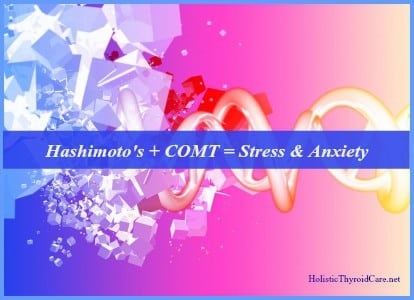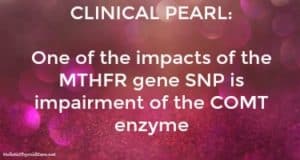
Some of the earliest symptoms of Hashimoto’s include stress, anxiety and panic attacks often to the point that it’s crippling. These conditions may occur for a variety of reasons; for example, the early phases of autoimmunity often trigger stress and anxiety as the immune system loses “self-tolerance” at the molecular level and attacks its host’s tissues (i.e. YOU). Shifts in thyroid hormone levels can definitely cause anxiousness (when there is too much thyroid hormone in the body) to exhaustion or depression (as a result of too little thyroid hormone available). Also, since stress plays a role in suppressing the health of the immune system through the nervous and endocrine systems, stress is thought to be a common trigger for autoimmune thyroid disease…Hashimoto’s and Graves’ disease. There may be another factor triggering stress and anxiety for individuals with Hashimoto’s…COMT.
Genetic Single Nucleotide Polymorphisms (Gene SNPs) are very common in people with Hashimoto’s. The gene SNP MTHFR (Methylenetetrahydrofolate reductase) is one of the most commonly discussed genetic mutations among individuals diagnosed with autoimmune thyroid disease. However, there is another genetic mutation that’s gaining increasing attention called COMT (Catechol-O-methyltransferase). Researchers have found that the impact of having the MTHFR gene SNP is impairment of the COMT enzyme.
What is the COMT Enzyme?
The COMT enzyme:
“…provides instructions for making an enzyme called catechol-O-methyltransferase. Two versions of this enzyme are made from the gene. The longer form, which is produced by nerve cells in the brain. Other tissues including the liver, kidneys, and blood produce a shorter form which helps control levels of certain hormones.”
For people with a low or intermediate activity of the COMT gene SNP (specifically the COMT v158) there will be reduced catechol-O-methyltransferase enzyme function. What this means is that their body doesn’t have the ability to methylate and detoxify epinephrine and estrogen.
Epinephrine is also known as adrenaline – a neurotransmitter secreted by the adrenal glands in response to stress. If your body isn’t able to break down adrenaline, you will likely experience a constant state of flight or flight and heightened level of extreme stress and anxiety. Imagine how awful it would be to experience elevated adrenaline 24/7. It can leave an individual feeling scared, and hopeless.
Estrogen dominance can be related to a variety of issues such as stress, xenohormones in the environment, birth control pills, estrogen replacement therapy, poor diet, or a sluggish liver. It’s frustrating for women who are doing everything “right,” and still find they are estrogen dominant, believing it’s related to their liver and this may not be the case at all.
Hashi’s Sister’s Interview with guest Brooke Bouis on COMT & Methylation:
[video_lightbox type=”url” style=”1″ url1=”” url2=”” width=”511″ height=”288″ placeholder=”https://holisticthyroidcare.net/wp-content/uploads/2016/12/Brooke-Bouis-Interview-2.png” placeholder_width=”450″ placeholder_height=”300″ align=”center”]aHR0cHM6Ly9zMy11cy13ZXN0LTIuYW1hem9uYXdzLmNvbS9ob2xpc3RpY3RoeXJvaWRjYXJld2ViaW5hcnJlY29yZGluZ3MvSGFzaGlTaXN0ZXJzX1dlYmluYXJfTWV0aHlsYXRpb24ubXA0[/video_lightbox]
What I have found in my own wellness practice this past year is that the majority of women with Hashimoto’s actually do have the COMT genetic variation. The sad part is that many have been prescribed dangerous antidepressants and anxiolytic medications for stress, anxiety, or panic disorder. This is SAD because their symptoms were actually related to a methylation/detoxification problem, not a psychological one. However, their prescriber didn’t have this information at the time. In addition, for the women who reported feeling worse on estrogen replacement therapy, they nor their prescriber were aware that their body couldn’t methylate and detoxify estrogen. This meant that their issue with hormone replacement was not a “sluggish liver” problem at all as they had been led to believe.
Along with the methyl detox profile, I also encouraged neurotransmitter testing for these women. Testing was done by two separate lab companies and for every test result that was positive for the COMT gene SNP, epinephrine was in fact significantly elevated on the neurotransmitter test in addition to elevated estrogen or an imbalanced Estrogen: Progesterone ratio.
What You Should Know Now about COMT
COMT methylation and detoxification require SAMe and Magnesium.
Estrogen metabolism needs COMT, and COMT needs SAMe. If stress and anxiety are extreme in an individual who has both the COMT and MTHFR gene SNPs, the form of vitamin B12 indicated to start with is Adenosyl/Hydroxy B12 (not methyl B12).
If any of the following factors apply to you – I urge you to please get tested for the COMT v158 genetic mutation. It could change your quality of life significantly:
- Extreme stress & anxiety or panic attacks
- Estrogen dominance due to perimenopause or if in menopause and you feel worse with estrogen replacement therapy
- Diagnosed with Hashimoto’s or hypothyroidism
- Tested positive for MTHFR c677 and/or a1298c
COMT Testing Considerations
The methyl detox profile by Genomics Insights has been an extremely useful tool in my practice. Not only does it offer data on the top genetic SNPs that are potential of concern, but it also shows where you may be getting “stuck” in the methylation/detoxification cycle. To know only whether or not a person is homozygous or heterozygous for a specific gene SNP doesn’t really provide enough individualized information in terms of devising a lifestyle and wellness care plan. This test is offered as a buccal (cheek) swab or as a blood test when ordered as an add-on to a food and chemical sensitivity test.
Molecular Testing Labs Comprehensive Genetic Report is a cheek swab test available through select physician’s offices as part of a clinical trial (as of this writing). A client did this test last spring and it not only showed genetic variations but also clinical consequences AND pharmacogenetic test results. This means an individual can know which prescription medications they should avoid, standard precautions, those medications to be used with caution, and alternative suggestions for those medications they should avoid forever.
The 23andme test provides raw data for countless genes which must then be uploaded into a database such as Genetic Genie, LiveWello, NutraHacker, or MTHFR Support (newly updated StrateGene). This type of testing will not include a methyl/detox profile, it’s raw data only. I find it often overwhelms the public-at-large since not all genetic SNPs have a negative impact.
Signs and Symptoms that Methylation (in general) is Impaired
[two_column_block style=”undefined”] [content1]
- Diabetes
- Depression/Mood disorders
- Stress/Anxiety/Panic Attacks
- ADHD
- Premature Aging
- Suppressed Immune System
- Digestive problems
- Fibromyalgia/Chronic Fatigue Syndrome
- Miscarriages, infertility & problems during pregnancy
- Cardiovascular disease
- Cancer
- Addictive behavior including alcoholism
- Insomnia
[/content1] [content2]
- Autism and other spectrum disorders
- Bipolar or manic depression
- Allergies or multiple chemical sensitivities
- Atherosclerosis
- Hashimoto’s or Hypothyroidism
- Multiple Sclerosis & other autoimmune disorders
- Parkinson’s
- Dementia/Alzheimer’s
- Neuropathies
- Chronic viral infections
- Low T cells or reduced NK cells
- Sensitivity to medications
[/content2] [/two_column_block]
Functions of Methylation
[two_column_block style=”1″] [content1]
- Gene regulation
- Detoxification
- Neurotransmitter formation
- Metabolize hormones (estrogen)
- Immune regulation
[/content1] [content2]6. DNA and RNA synthesis
7. Produce energy (mitochondria)
8. Nerve myelination
9. Energy production
[/content2] [/two_column_block]
I hope this article helps you or your family in some way! Please note that if you test positive for any gene SNP, you may want to share the information with your parents or children and encourage them to be tested as well…particularly if they have Hashimoto’s or any other autoimmune condition.
References:
- COMT gene – Genetics Home Reference. (n.d.). Retrieved December 10, 2016, from https://ghr.nlm.nih.gov/gene/COMT
- Domschke, K., Freitag, C. M., Kuhlenbäumer, G., Schirmacher, A., Sand, P., Nyhuis, P., . . . Deckert, J. (2004, March 5). Association of the functional V158M catechol-O-methyl-transferase polymorphism with panic disorder in women. The International Journal of Neuropsychopharmacology,7(2), 183-188. doi:10.1017/s146114570400416x
- Mizokami, T., Li, A. W., El-Kaissi, S., & Wall, J. R. (2004). Stress and Thyroid Autoimmunity. Thyroid,14(12), 1047-1055. doi:10.1089/thy.2004.14.1047
- Roach, J. (2013, May 6). Understand COMT and Change Your Life! Retrieved December 10 2016, from http://www.abihm.org/understand-comt-and-change-your-life
- Zenker, B., (2016, July). Methylation and Genetics, Microbiome and Methylation [PowerPoint Slides]. Conference conducted in Nashville, TN.






Great article! How do you find the doctors who are doing the Molecular testing clinical trials now?
Great article. How domyou find a doctor who is doing the Molcular testing trials now?
what the percentage of snps problem in hashimoto there must be other causes too such as stress and toxins
Maybe I missed it, but what is the treatment I’d COMT is found?
Why don’t you have a Pinterest button to allow us to share this? Great video and article.